Last Saturday night, a historic victory took place at Daytona International Speedway. Harrison Burton picked up the 100th win for the Wood Brothers while also claiming his first career Cup win. At the track that the organization has found much success, Burton becomes another improbable name to hoist a Daytona trophy in the 21 car. A feel good win that everyone in NASCAR can enjoy. Todd Gilliland journeyed across the front stretch lawn to congratulate Burton at the start/finish line. Multiple drivers made it to victory lane to give praise to Burton. Jeff Burton whisked down from the commentary booth to join his son. When the Wood Brothers win, it is difficult to be displeased with the result. Until you realize that NASCAR has sapped all of the value from what a win is in their current system.
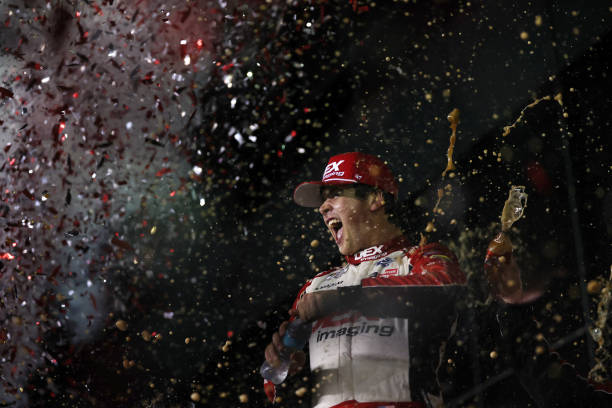
In modern day NASCAR, the regular season is entirely focused around the 16 drivers who will make the playoffs. Every new winner is welcomed to the playoffs by the trackside reporter. When NBC takes over coverage, they plaster the active playoff grid throughout each race. It is inescapable. While the playoffs have been common since 2014, the win-and-in system fans know today was not established until 2023. Although win-and-in existed, a driver’s points position somewhat matter prior to 2023. The requirement for a driver/team to rank in the Top-30 (for Cup) in points was abolished. If you are fulltime, you win and you are in no matter what.
With the current format, how does that devalue the win? If it means a playoff birth for the ability to race for the championship, does that not make it the most important thing? Well, that is the difference between a NASCAR win versus “winning”.
Devaluing Through Addition
Winning at the top level of NASCAR is difficult to do. Harrison Burton is now the 205th driver to have the title of Cup Series winner. Out of nearly 3,000 drivers who have started at least 1 Cup Series race, Burton joins that exclusive list. Based on that alone should mean that a Cup Series win is valuable. Each week, at least 36 drivers and teams grind through a rigorous race to beat their opponents. Only one driver is able to proclaim ultimate victory. Somehow though, NASCAR has deemed that accomplishment not worthy to stand alone.
NASCAR adding a playoff implication to every win fundamentally changes what a win means. Once you add more “value” to something that should already be coveted, then by nature said thing loses its inherit worth. Winning a Cup Series race for the accomplishment of the win is not worthwhile anymore. NASCAR has artificially added “value” to a win, especially during the regular season. During the first 26 races of the year, winning a race is not truly for the race win. Instead, it is for the championship implications that go along with crossing the line first. Some may argue that is a distinction without a difference. Yet, what is usually the first thing spoken to the race winner? Something about the playoffs.
Racing for the Playoff Points
On The Teardown this week, Jordan Bianchi and Jeff Gluck discussed how Daytona was a shining example of what makes this current format great. An underdog of all underdogs rises up, plucks a win, and earns a spot in the playoffs. Without the drama from his last lap antics, the same would have been said about the Austin Dillon Richmond performance. Along with that, the current format rewards winning so greatly that the days of a “good points day” are a thing of the past. Drivers, due to the format, have to chase wins insistently to better their championship odds. While the entertainment value might be improved with this logic, it sours the underdog story and forces drivers into bonehead mistakes.
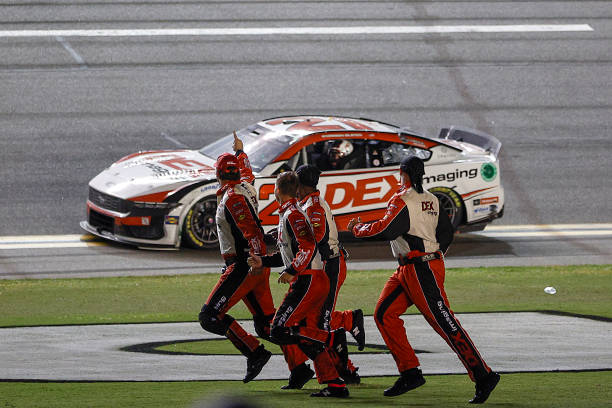
Harrison Burton’s Daytona win should not be clouded by the looming playoff implications. Even for the fans who can put aside them for the sake of the moment, it will return to the forefront of thought starting this weekend. The last place fulltime driver on points will compete for the championship over the driver who potentially sits as high as 11th in points. Despite the win, Burton still ranks 10 points behind the next closest driver.
Yes, everyone “knows the rules” about this format heading into the season. If a driver does not want to be on the cutline, then they should win. All valid arguments. However, winning a Cup Series race is a difficult endeavor. Only one driver can do it each week. Unless NASCAR wants every driver in the field to hold a Ricky Bobby mentality, consistency needs to matter when it comes to the playoffs for every driver.
Plus, NASCAR has seen the ugly side to this win-and-in format. Austin Dillon wrecked two drivers to win Richmond. Why? Because that win granted him access to the playoffs and at least $2 million more in payout at season’s end. Dillon’s bulldozing was not for the win, it was for the implications of the win.
Gimmicks Do Not Enhance
Gimmicking the race win for 35 of the 36 races in a season does not make the win better. While the accomplishment of winning a race is still there, the glaring issue of the gimmicked nature of the “value” stares fans right in the face.
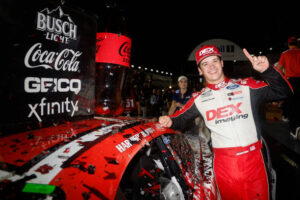
Did the playoffs impact Harrison Burton’s desire to win the Coke Zero Sugar 400? Does it add more intrigue to the Wood Brothers picking up their historic 100th win? Since the implication is that the playoffs helped create Burton’s desire for said success, would he not have done the same exact thing if there were no playoff implications? All those questions have the same answer: no. The playoffs did not help add value to what Burton did on Saturday night. Based on his immediate reaction to the win, the playoffs were not even on the mind. Nabbing the Wood Brothers 100th win before being let go at season’s end was the driving motivation. That, along with collecting his first career Cup win.
NASCAR thinks the underdog story of Harrison Burton making the playoffs with this win is what draws fans into the sport. Actually, it feels quite the opposite. Fans see Burton’s playoff spot as a waste compared to a competitor who could foreseeably string together 10 races to win a championship.
Prior to the win-and-in format, Cup drivers did go for the win when they could. There is a long history of aggressive moves in the hope for a win. No playoff access needed. Why did they do it? Once again, because winning the race after grinding through miles of competition was enough value to do so. However, maybe the driver in fourth will not do a dive bomb into Turn 1 without the playoff implications. NASCAR knows every fan wants that instead of quality racing. What a shame.
The Flip Side
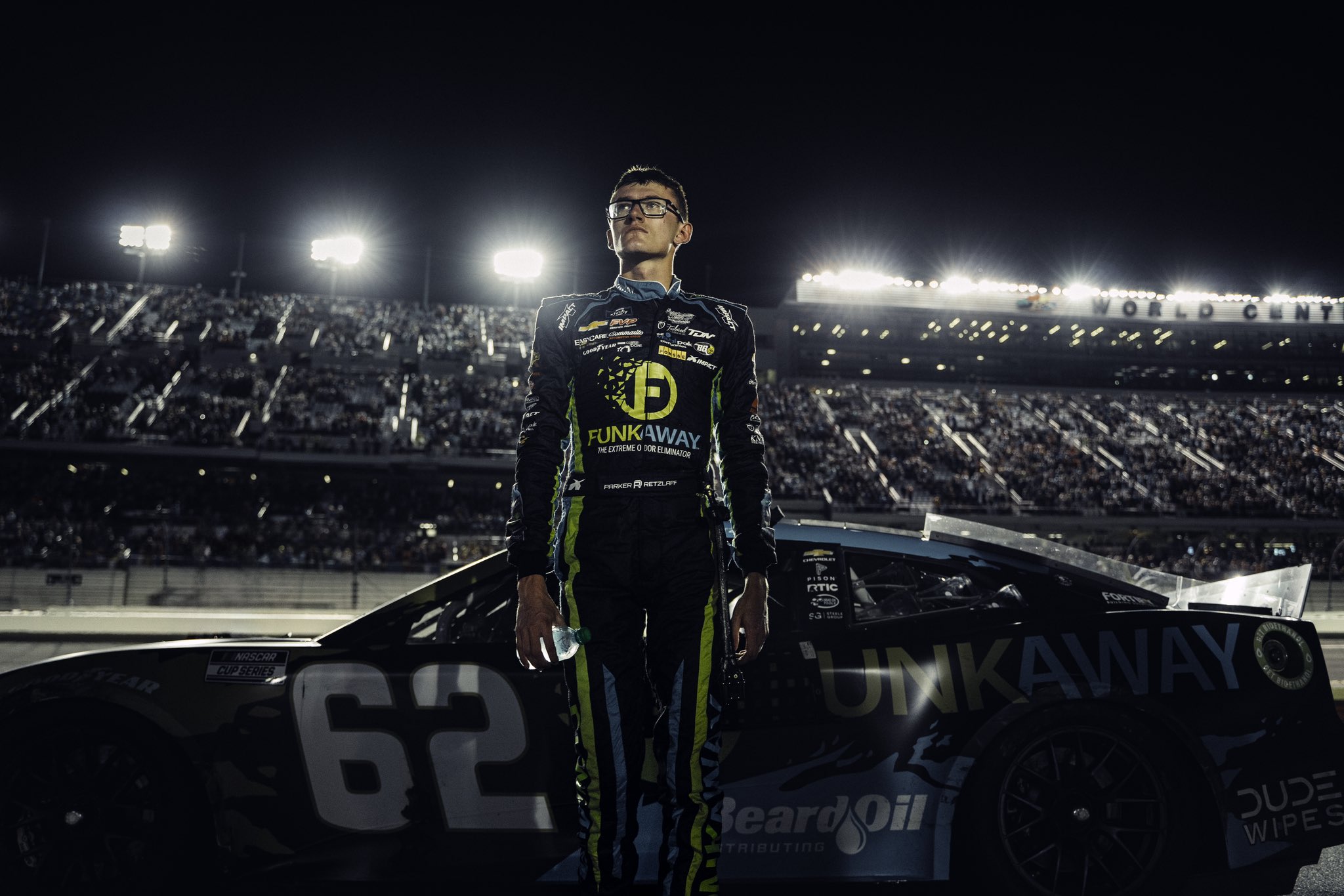
From the highs of the Harrison Burton win to the lows of the worst story to come from Daytona. Parker Retzlaff made his second career Cup start Saturday night. After surviving the carnage, Retzlaff came to the choose cone in fourth. Ahead of him laid two choices. Option 1 was to hold true to Chevy desires to help Kyle Busch make the playoffs. Shun away the chance to line up on the second row in a green-white-checkered situation because maybe he pushes the wrong guy to victory lane. Meanwhile, option 2 is that second row. Sure, he will be pushing Ford who is out of the playoffs. However, the opportunity to win is one sling-shot maneuver away.
In the era where winning is the most important thing, Retzlaff choosing to go for it should applauded. Instead, Retzlaff is facing heat from Chevy since he lined up behind Harrison Burton. That is what this current format gifts a young driver.
While there might have been gripes about it without the win-and-in, that surely is the driving force. Due to “Retzlaff’s actions”, Ford now ties Chevy with locked in playoff drivers. If the standings remain the same as of this writing, Ford will surpass Chevy (and Toyota) with the most drivers in the playoff field. Hence why Chevy is angry at Retzlaff and he has to apologize for what he did.
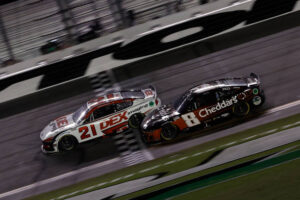
What a joke that is. Retzlaff is making his second career start with part-time team. If he is not only there to race for the win, then what is the point? It would be a different argument if Retzlaff was third to choose. If he chose to line up behind Burton instead of Busch, that would be understandable frustration. However, Retzlaff did the right decision and went for the win. Although Burton won, maybe Chevy should be more upset with the veteran driver who got schooled by the youngster.


